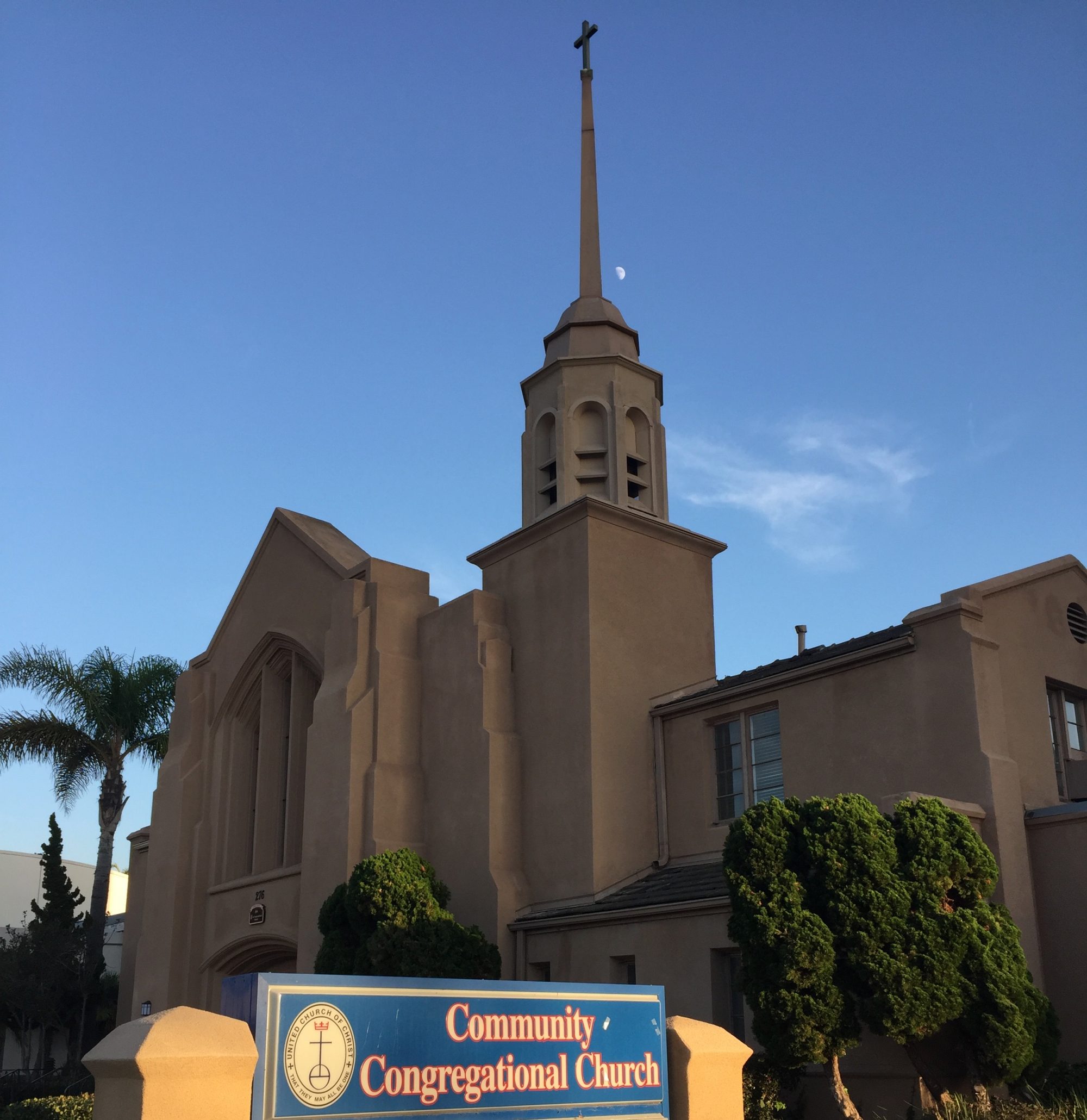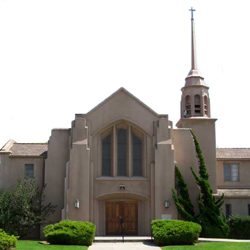“Praying When You Are Alone”
A meditation based on Psalm 22:1-11
February 25, 2018
Community Congregational Church of Chula Vista
Dr. Sharon R. Graff
* * * * *
“ELI ELI LAMA SABACHTHANI”
These words rang out, dramatically, through the baritone voice of the reader that night long ago. It was Holy Thursday and a meal had been shared. Flickering candles extinguished one by one, representing the fleeing disciples of Jesus, as familiar scriptures described that first night when Jesus was left alone. Friendless. Beaten. Abandoned. One candle only remained lit. “ELI ELI LAMA SABACHTHANI” The deep voice rang out a second time, more anguished than the first, and there was absolute stunned silence in that dinner room. It was as if we, too, were at the foot of the cross, looking up at the withering life of Jesus, feeling his pain as our own, hearing his cries for help from a God who seemed very far away.
Eli Eli Lama Sabachthani. The echoes of that stark phrase hung in the air that night in a way I hope I will never forget. Jesus was dying. God was absent. And the world, for a moment, stood absolutely deathly still.
How do we pray when we are alone? Alone, as Jesus was when his friends fled. Alone, as Jesus was when the deck was clearly stacked against him. Alone, as Jesus was, save for the frame of the two criminals executed either side of him. Alone, when it seemed as if God was absent and God’s beloved abandoned.
We pray, no doubt, as Jesus did. Honest. Blunt. No holed barred. Raw. More sighs than words. Tears followed by sobs followed by that same deathly silence. Being alone, like this, is not pretty. When we are there, we feel as if there is no relationship—divine or human—that can lift us out of those depths.
Friends, we’ve all been there. It might have been when the doctor says, “Nothing more we can do…” Or the phone call comes bearing still more bad news. Or the son or daughter tells you they have little time left to live. The aloneness of Jesus on the cross, an aloneness that brought him to the point of quoting Psalm 22, is a state of utter abandonment that is part of the human condition. And when we are in that state, we pray much like Jesus did.
Eli Eli Lama Sabachthani. Which translates, from his mother tongue, Aramaic, into these words, “My God, My God, why have you abandoned me?” The first words of the psalm we read together just a few minutes ago. There it is. Bold. Bald. Blunt. Here, the one praying is left utterly alone, by others—friends and enemies alike—and by God, or so it seems. And he, or she, prays with a level of courageous honesty right out of the gate. No “Good Morning, God” or “Blessed Creator” or “Thank you for this day.” No theological platitudes. Raw honesty is what God gets from the psalmist today. And from that raw honesty emerges the pathway that eventually winds around to something that looks like faith and something that sounds a bit like hope. But faith and hope are not the vehicles this time. They are the byproduct, and brutal honest prayer the courageous vehicle.
I always find it worthy of note when a person is willing to admit that they get angry with God. That takes courage…first to be angry…second to admit it. It’s not that God might not be able to handle our anger—for God certainly can. It’s that most of us have been taught to be pleasant and proper and polite in the presence of the Creator of the universe. Yet, it has been my experience, and more importantly, the experience of women and men throughout scripture, that when we feel alone and we are willing to abandon politeness in favor of honesty in our praying, then it is that God ceases feeling so very far away from us.
We can imagine that when Jesus quoted Psalm 22 that day on the cross, it was such an experience.
My God, My God, why have you abandoned me? Why are you so far away from helping me? Why do you not even listen to my groans? I’m crying out to you each day, and there is no answer from you…I’m crying out to you each night, and yet there is no rest.
Friends, this is stark praying at its finest. And from that point of brutal honesty, the psalmist—and Jesus—both show us what it looks like to move forward. Moving from abandonment to cynicism, the psalmist reminds the seemingly absent God that, in fact, God was present long ago, yet not (apparently) now… The psalmist, emboldened, claims God is an egotist: holy, sitting on a throne caked with praises, entrusted by the ancestors, saved them even, but not now swooping to save this struggling human. The psalmist concludes, in that moment of starkly felt abandonment, that he or she must be a worm, unfit for God’s attention. Oh, he’s getting the attention of others…like Jesus, the psalmist is mocked by all who are there; and having felt this same mockery ourselves, we can well imagine the wagging fingers and the wagging tongues, “Well, if God is any kind of God, where is God now to save you?”
You know, there are many times in the scriptures when God is put to the test of responding to human need in an immediate and specific way. Now, God, save me now and do the saving this way. Again, we’ve been there. We’ve tried, time and time again, to snap our fingers and wave God into action on our behalf and, more immediately and with more passion, we’ve tried to snap God into action for those we love. Those first eight verses of Psalm 22—quoted by Jesus from the cross, and quoted countless times over the centuries since they were first written—they are all about praying while abandoned, praying when we are alone. And these prayers include brutal honesty, bold cynicism, courageous anger, righteous resentment, and even abject self-loathing.
But that is not the end of the prayer when we feel alone. For after that display of brutal honesty, as the psalmist calls out God for God’s seeming absence and lack of caring, I can imagine between verses eight and nine a very long pause. Another sort of deathly silence, in which the death of self-loathing and the death of God’s absence and the death of the power of public mocking are themselves abandoned.
For the psalm turns at that point.
“You reached into the womb and brought me to birth…You kept me safe and nourished as a baby at my mother’s breast…and ever since my birth, you have been my God…”
These are such tender images, powerfully life-giving descriptions of this same God who, a moment ago seemed absent, and now is as close as our own mother’s heartbeat gently lulling us to sleep as we eat. To that God—Mother, Father, Holy Presence—the psalmist then whispers, “Do not be far from me. Trouble is near. There is no one else to help.”
Again, imagine Jesus, willing to call God out for leaving him alone on the cross, willing to courageously pray through the aloneness, willing to pause, and in that pause, willing to entertain images of a God who was and may be again, present even in the aloneness. That is powerful, honest, courageous praying. It is praying that keeps praying through the pain and with the voice of pain. It is praying that allows silence to do the heavy lifting. And on the other side of that silence, on the other side of those sobs, on the other side of that cynicism, on the other side of even calling out God for God’s seeming absence, this is praying that moves us forward on our journeys of faith.
Every time I’ve prayed like this, something good has followed. Something so good I could not even have imagined it, nor could I have brought it into being. Every time in scripture when we encounter this type of praying, something good follows. Something healthy. Something unpredictably surprising and life-giving.
Today, the psalmist teaches us a stark and real part of the human condition. Bad things happen to good people. And when they do, we good people sometimes blame God, even as we look to God to save us. We are not to be faulted for being this human. We are to be kind to one another and, most especially, kind to ourselves. For everyone in this room—and everyone out there—is carrying some sort of burden that makes them, at times, feel abandoned by God and alone in the world. And when we feel that sense of aloneness, we can turn our anger toward the One who has promised to love us no matter what and no matter where and no matter who we are in that raging moment. God can handle my anger and yours, my sisters and brothers. And God can make of that anger a passionate tapestry of our memories…a tapestry of scene after scene from our own lives when God has been there for us and with us.
God can make of our honest praying a whisper that dares to be heard, “Do not be far from me. Trouble is near. There is no one else to help.” And from that whisper we begin to hear the sounds of resurrection once again.
Amen and Blessed Be

